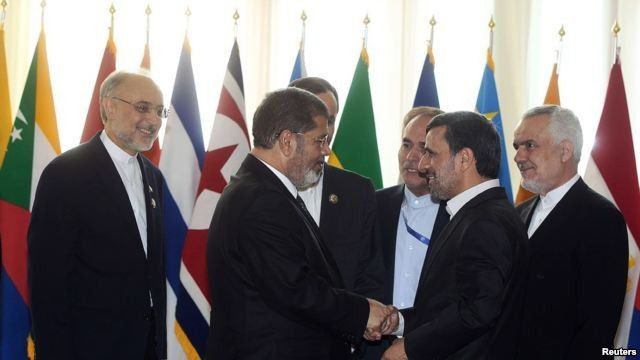Not So Aligned: Egypt's Morsi Slams Syria At Non-Aligned Summit In Iran

Anyone who assumed that Egyptian President Mohammed Morsi's visit to the Tehran summit was an unmitigated, no-strings-attached gesture of friendship and reconciliation between Cairo and Iran will probably want to re-evaluate.
In his speech before the Non-Aligned Movement's (NAM) assembled 120 countries, Morsi condemned the Assad regime of Syria and declared his support for the opposition Free Syrian Army. (Iran's government has staunchly remained one of Assad's prominent defenders and allies.)
Both Iran and Syria are two members of what Tehran has called the "axis of resistance" against the U.S. and Israel. The third member is Hezbollah, the militant group based in Lebanon.
Iran considers the rebellion in Syria to be the act of "terrorists," and never calls the Syrian uprising a rebellion, instead characterizing it as "unrest"
Morsi's speech on Friday made it clear that this is not how Egypt sees it.
"We all have to announce our full solidarity with the struggle of those seeking freedom and justice in Syria, and translate this sympathy into a clear political vision that supports a peaceful transition to a democratic system of rule that reflects the demands of the Syrian people for freedom," Morsi said.
"The bloodshed in Syria is our responsibility on all our shoulders and we have to know that the bloodshed cannot stop without effective interference from all of us," he added.
"The Syrian crisis is bleeding our hearts."
Morsi also said that Egypt had "an ethical duty" to support the Syrian opposition against the "oppressive regime" (of Assad) and even equated the Syrian rebellion with "the struggle for freedom by the Palestinian people."
Syria and Egypt were once close allies, and even unified to form the United Arab Republic briefly from 1958 to 1961 during the halcyon days of Gamal Abdel Nasser.
But now a Sunni Muslim government is in power in Egypt, a Sunni rebel force is fighting against an Alawite-Shiite Syrian government, and Iran's official religion is Shia Islam.
If nothing else, the lines drawn are drawn on religious grounds. Moreover, one government who recently experienced a revolution and overhaul (i.e., Egypt) may feel an "ethical duty" to support a rebellion in a nearby country (Syria).
Upon hearing Morsi's critical comments, Syria's Foreign Minister Walid al-Moallem walked out of the conference.
"Morsi's comments violated the traditions of the summit and are considered interference in Syrian internal affairs," he complained to reporters.
Iranian leaders side-stepped the Syrian issue in their statements, instead choosing to focus on the controversy over their nuclear program.
But Shadi Hamid, an analyst at the Brookings Institute in Doha, Qatar, told Reuters that Morsi's comments will have a definite effect.
"His speech shows he is not going to indulge the Iranians even when he sitting right next to them," Hamid said.
© Copyright IBTimes 2024. All rights reserved.






















